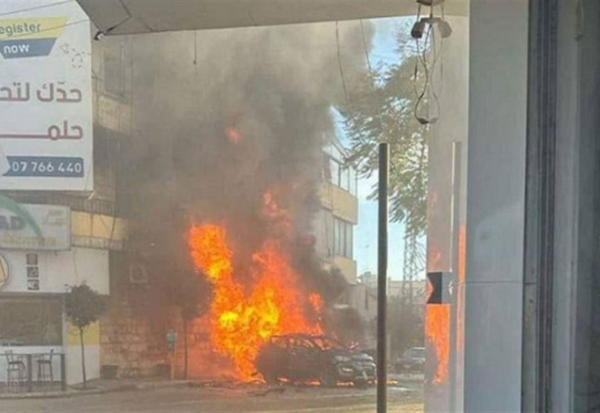A drone strike that targeted a vehicle reportedly belonging to a senior member of Hezbollah in Nabatiyeh, south Lebanon. Sky News Arabia sources revealed that Hezbollah’s military commander-in-chief, Ali Karki, was the primary target of the Nabatieh attack in southern Lebanon that took place on Thursday, but he survived.
Hezbollah has launched a new salvo of attacks against northern Israel in response to a drone strike that targeted a vehicle reportedly belonging to a senior member of the group in southern Lebanon.
While the Israel Defense Forces (IDF) has not claimed responsibility for the operation in the southern Lebanese city of Nabatieh, the strike came amid escalating rhetoric and ongoing clashes across the Israel-Lebanon border that have been raging since the outbreak of war between the Palestinian Hamas movement and Israel four months ago.
The target has also not been publicly confirmed, though a number of Arab and Israeli media outlets have identified one of those hit as a senior Hezbollah official named Abbas al-Debs, citing various unnamed sources.
Reached for comment, a Hezbollah spokesperson would neither confirm nor deny the identity of the target, telling Newsweek that Debs’ name “was mentioned by Israel, not by us.” The Hezbollah spokesperson also maintained that “no one has been martyred, there are only injured thus far.”
Asked about how the group planned to respond, the Hezbollah spokesperson cited the words of Hezbollah Secretary-General Hassan Nasrallah, saying “the [battle]field speaks.”
“Now sirens are sounding in a number of settlements,” the Hezbollah spokesperson said.
The Hezbollah spokesperson’s remarks coincided with IDF reports of sirens sounding across northern Israel and warnings issued by senior Israeli officials.
Throughout the day, both before and after reports emerged of the apparent drone strike in Nabatieh, the IDF reported on airstrikes and artillery fire being launched against Hezbollah in Khiam, Kfar Kila and Tayr Harfa as well as rocket attacks originating from Lebanon against Israel in Kiryat Shmona, Biranit, Mount Hermon and Metula.
One IDF soldier was said to have been seriously injured and two more lightly injured as a result of the cross-border clashes on Thursday.
That same day, Israeli Air Force Commander Major General Tomer Bar issued a direct threat to the group during an operational conference held at Palmachim Airbase.
“Hezbollah will continue to pay with the loss of its systems,” Bar said. “Dozens of aircraft are now operating in the skies of southern Lebanon, and the moment an order is given—the dozens will turn into hundreds carrying out the missions within minutes from launch.”
Hezbollah too has broadcast its attacks against Israel “in support of our steadfast Palestinian people in the Gaza Strip and in support of their valiant and honorable resistance.” Throughout Thursday, the group claimed strikes against some of the sites referenced by the IDF, as well as additional sites across northern Israel.
Operations against Israeli military bases in Mount Meron and Ain Zeitim were specifically said by Hezbollah to have been conducted as a response to IDF attacks on Lebanon, “especially the recent attack on the city of Nabatieh.”
Such exchanges of hostilities across the Israel-Lebanon border have played out on a virtually daily basis since the Hamas-led surprise attack on Israel four months ago sparked the worst-ever round of Israeli-Palestinian violence.
Also on Thursday, the Lebanese group’s media office carried remarks by Hezbollah Central Council Member Nabil Qaouk, who was said to have “pointed out that the Israeli enemy threatens Lebanon every day, but the resistance is not afraid of its threats, it is defeated groaning from severe and bloody wounds, and the resistance has prepared for all possibilities beyond all calculations, and the south will only be an arena for their defeats.”
Hezbollah has yet to reference the drone strike in Nabatieh in its official statements, nor any connection to Debs.
Debs was previously identified in intelligence shared last year with Newsweek by an intelligence source from a nation allied with the United States. Debs was referred to as a Hezbollah operative who worked as part of an extensive project backed by Iran’s Islamic Revolutionary Guard Corps to establish an air defense network in Syria.
The reported drone strike in Lebanon on Thursday comes just one day after the United States conducted a drone strike targeting Iraq’s Kataib Hezbollah, a fellow member of the Iran-aligned “Axis of Resistance” that has targeted Israel and U.S. troops in Iraq, Syria and Jordan in response to the war in Gaza.
Among the dead was Kataib Hezbollah commander Wissam Mohammed Saber, also known as Abu Baqir al-Saadi.
The U.S. attack drew widespread condemnation in the region, including from the Iraqi government and various “Axis of Resistance” groups across the Middle East.
In a statement published Thursday, the Lebanese Hezbollah derided the U.S. strike as “a continuation of its previous crimes and its continuous aggression against the peoples of our nation in Iraq, Syria and Yemen, and a flagrant violation of Iraq’s sovereignty, security and stability.”
“The resistance movements in the region have full confidence in the mujahideen of our Iraqi people,” the group added, “who insist on adhering to the path of resistance and liberation and continue to support the oppressed Palestinian people.”
Newsweek


Leave a Reply
You must be logged in to post a comment.